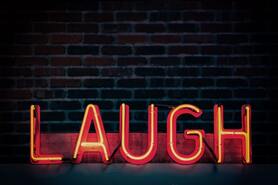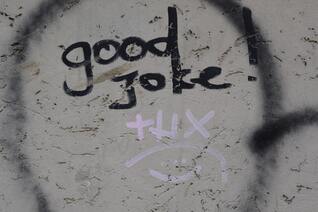 Photo by Tim Mossholder on Unsplash Photo by Tim Mossholder on Unsplash by Daniel Hewitt To offend or not offend—that is the question—and it’s an important one when it comes to comedy. It’s been said that laughter is the best medicine, and the goal of comedy is to make people laugh whether it’s comedy in literature, stand-up comedy, or sitcoms. There are times when we all need to throw our heads back and laugh out loud. Comedy’s use of language, wordplay, innuendos, and puns can all be used effectively--without being offensive. Comedy has come a long way since the 1990s—what was funny back then would be considered totally unacceptable now because society’s standards of decency have evolved. Jokes made at other people’s expense are not funny—they’re hurtful. Making people laugh doesn’t have to mean making jokes about Black people and other minorities. In this age of social justice, Black Lives Matter, and the #MeToo movement, it’s important that comedians think about the material they write before publishing it—whether it’s in books, magazines, blogs, or stand-up comedy—and ask themselves “would I laugh at this if I were a member of a racial minority? Or a member of a marginalized group?” Making people laugh at the expense of shaming others diminishes them and attacks their dignity. Low comedy uses physical and crude humor such as making derogatory remarks about minority groups, using offensive racial slurs, and perpetuating misogynistic views on women. Capitalizing on human traits that can’t be controlled is the poverty of good comedy. Some comedy authors disguise their intentional racist humor and disdain for marginalized groups under the guise of dark humor which is a comedy style that makes light of serious subjects such as poverty, discrimination, and human sexuality that can provoke discomfort in readers. Brad Gosse is a comedian and author of several books. His website introduction states “Dark humor comedian with over 100 books in print. Eventually I will offend you. We can still be friends.” He published a series of books entitled 14 Of The Most Terrible Children’s Books that contain racist clipart. Another book is called Sextoy Story, a parody of Disney’s Toy Story. Another book is called My Racist Dog Only Trusts Whites. Gosse uses various social media platforms such as Facebook, TikTok, Instagram, and YouTube. His works are seen by millions of people. In an interview with CreatorMindset, he openly admits that his “biggest obstacles have been getting videos removed for community guidelines violations and temporary suspensions from TikTok. The platform is extremely punitive to creators like me who tend to push boundaries with humor.” Some comedians confuse offensive humor with satire—but satire is intellectual wit and is difficult to do. We’ve seen what happens when comedians cross the line. It’s vital that comedians have an awareness of what’s acceptable and what isn’t because sooner or later what they say—can—and will—come back to them. How many times have we seen comedians get canceled because of something they’ve said that was intentionally offensive? Like other celebrities, they lose the respect of their fans as well as their reputation and their brand suffers. Arthur Gackley (not his real name) found out the hard way when he was forced to ask his publisher to stop printing Bad Little Children’s Books which featured parodies of children’s book covers that contained pictures depicting discrimination and racism due to the backlash it received from critics. Some images were clearly not satire as Gackley insists – one cover depicts a Native American family with the title The Anti-Vaccine Kid and the Gift of the Navajo Blanket Riddled With Smallpox. The author defended his work saying, “the book is clearly not being read by some in the way I had intended—as satire—and, more disturbingly, is being misread as the very act of hate and bigotry that the work was meant to expose, not promote.”  Photo by Marija Zaric on Unsplash Photo by Marija Zaric on Unsplash Good comedy needn’t be offensive. It can tell a story and use the element of surprise to pique the audience’s interest and keep them attentive and engaged. Topics such as the human condition, people doing weird things or writing about events that are so bad they’re funny are some ideas for making people laugh. Comedians writing for a specific audience should intuitively know what makes that audience laugh. British people are known for being able to laugh at themselves, but this might not translate well into other cultures. One example of good comedy done well in literature is the book You’ll Never Believe What Happened to Lacey published in 2021 by comedian Amber Ruffin and her sister Lacey Lamar and voted a New York Times bestseller. This book chronicles the sister’s experiences growing up with racism in a funny and entertaining way while at the same time highlighting the fact there is still a lot of work to be done in tackling this issue. In November 2022, the sisters published a sequel to the book entitled, The World Record Book of Racist Stories which contains more humorous anecdotes of everyday racism that Black Americans experience while at the same time conveying the message that racism is still present even in subtle ways. Some comedians do take accountability for causing offense--even if it was done a long time ago. This can go a long way to improving their image and their reader’s perception of them. An apology, no matter how late, is still acceptable and welcome if it is sincere. On the other hand, there are some, even in the face of criticism, who will not change their approach to humor or tone it down. They’ll make arguments about context being everything and blame the audience for being too easily offended. I would reply that if we’re too easily offended it’s because our standards of decency have evolved. If called out about their offensive behavior, comedians usually get quite vocal on whatever social media platform they’re using and respond with ad hominem attacks. While controversial comedy authors argue that free speech is protected by the first amendment, I would argue that they have the write (pun intended) to remain silent when it comes to offensive humor. Good comedy is out there! You just have to know where to look for it.
3 Comments
Daniel
3/3/2023 07:57:29 pm
The creator of the famous Dilbert character just had his comic strip pulled from several newspapers due to his inflammatory racist comments. He also lost a future publishing contract.
Reply
Michael Lit
10/12/2023 11:51:24 am
Since when did talking and joking about racism become racist? This is a stretch. My bet is the author of this article is covering for his own racist past.
Reply
Leave a Reply. |
Archives
July 2024
Categories
All
|
|
Glassworks is a publication of Rowan University's Master of Arts in Writing 260 Victoria Street • Glassboro, New Jersey 08028 [email protected] |
All Content on this Site (c) 2024 Glassworks
|

 RSS Feed
RSS Feed
